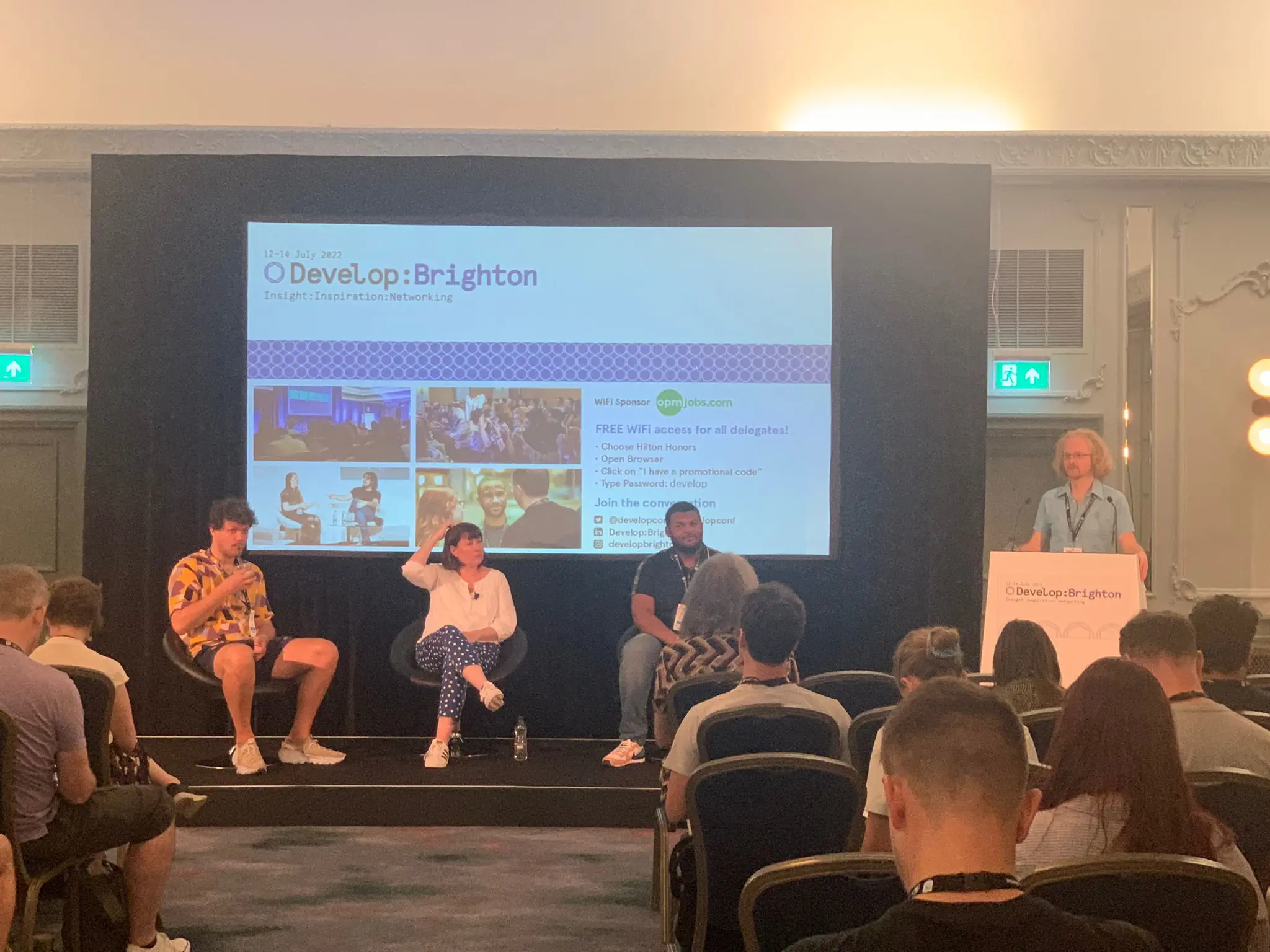Read a summary of the BAFTA-hosted panel event on social mobility in the games industry, which took place at Develop: Brighton 2022.
Data on the UK games industry shows an issue with social mobility within the sector. Respondents to the UK Games Industry Census reported an overrepresentation of people with parents from managerial or professional backgrounds versus those from more routine employment. And, a noticeable skew towards people who went to selective or fee-paying schools, with both measures increasing among more senior roles.
This suggests that not only is social background an issue with entry into the industry, but is also a factor in career advancement.
At today’s BAFTA talk at Develop, our Head of Games Luke Hebblethwaite discussed the Census’ findings and their significance with Gina Jackson OBE, Danny Gray and Tyler Rotheram with the aim of inspiring people to think about ways we can all help create a more welcoming and diverse games industry.
Emerging themes
Discussion among the panel and audience highlighted several strong themes and a range of insights:
How social mobility impacts creative outputs within the games sector and what are we losing from the voices that aren’t being heard
- Games are made for a broad range of people, so games should be made by all people
- Games have to reflect environments from experiences of all backgrounds; ‘capturing the magic’ of real environments by people with those experiences matter, otherwise they’re not credible
- The industry in the UK started off working class, but then put up barriers to entry possibly through an aversion to risk
- The way we recruit has a big influence as to who enters the industry – lots of people applying for roles, so the way applicants are sifted will place barriers
- Talent applying for jobs are being sifted without looking at their wider range of expertise and skills.
The challenges people face in both joining and their advancement in the sector
- Games careers are not widely accepted as viable options for young people from lower socioeconomic backgrounds. We heard of Tyler’s positive experience with Studio School in Liverpool which focused heavily on the tech sector and helped get people in. But otherwise education at that early stage – 16-17 – people aren’t being taught about networking or how to find opportunities that are critical to entry
- Lack of explanation within education of the range of career options available
- Lack of parental influence, which can be an encouraging factor that instils confidence to pursue opportunities
- The myth that, to have a successful career in games, success has to come early in life – early 20s – or it won’t happen. Later career entrants are discouraged in this way
- The high cost of computers or the right equipment to do a role may mean people can’t work from home, or they have to work other jobs to pay for equipment to start a career; this leads to lack of time to be creative and pursue opportunities
- University is a cost barrier if graduates are prioritised for roles
- Imposter syndrome is huge
- People aren’t getting in work training. Funding is there but employers aren’t accessing it. Might seem complicated, or unknown, or people might not think it’s part of their job to look into this
- Sounding different can make people not speak up – e.g. being a woman with a northern accent on a mostly male team, for example, can require great courage to speak up
- People can’t access work experience because employers feel morally obliged to fund it, but can’t, so that entry-level opportunity isn’t offered
- Cost of living crisis compounds these barriers; digital poverty is increasing
- Terminology of roles unique to the games industry makes it hard for people to understand how they can move between sectors.
How we identify barriers and better target efforts to improve access to the industry
- Multiple routes and interventions are required in tandem
- Recognition is important, e.g. BAFTA Young Game Designer programme and a competition that’s free to enter for 10-18 year olds can help solidify the fact it is a viable career, and offers introductions to the wider industry landscape
- It was highlighed how even being part of the BAFTA YGD process – and the community that exists around the programme – can provide a structure, connections and opportuities from which it’s possible to shape how young people can think about game making and also about how to have a career in games
- A broader range of mentoring programmes that support career changers, not just new entrants – those who come from other sectors with non-games experience, which is important for diversity of workforce at all levels
- Provide financial support so anyone can apply for roles, e.g. laptop loans/donations for junior levels
- Ask the right questions at interview that overcomes inherent bias
- Talk about inclusivity and accessibility in the workplace more, using appropriate terms, e.g. people might not understand what ‘working class’ means at an international company
- Existing employees can put pressure on their employers to do more to help support people from lower socioeconomic backgrounds
- Creating safe spaces at work, so people with regional accents feel they can speak up and be respected and heard
- Mentorship programmes can validate and give confidence to speak up, with those opportunities more visible
- Standardise terminology of roles across the creative industries (e.g. across film, games and TV)
- Colleges buying laptops for their students supported by studios, e.g. Creative Assembly
- Apprenticeships that every company can access – industry should explore those opportunities and make use of them more. There are degree- and masters- level apprenticeships available. Apprentices prove to be more loyal as the company trains them themselves and become an integral part of the business.





